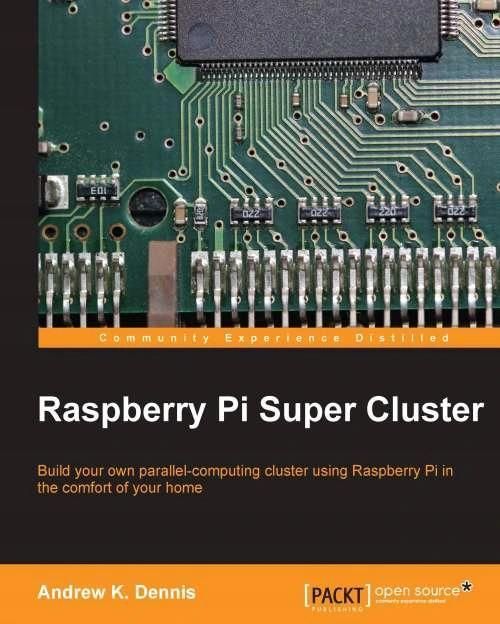
Raspberry Pi Super Cluster - Dennis, Andrew K.


Raspberry Pi Super Cluster - Dennis, Andrew K. - Najlepsze oferty
Raspberry Pi Super Cluster - Dennis, Andrew K. - Opis
A cluster is a type of parallel/distributed processing system which consists of a collection of interconnected stand-alone computers cooperatively working together. Using Raspberry Pi computers, you can build a two-node parallel computing cluster which enhances performance and availability.This practical, example-oriented guide will teach you how to set up the hardware and operating systems of multiple Raspberry Pi computers to create your own cluster. It will then navigate you through how to install the necessary software to write your own programs such as Hadoop and MPICH before moving on to cover topics such as MapReduce. Throughout this book, you will explore the technology with the help of practical examples and tutorials to help you learn quickly and efficiently.Starting from a pile of hardware, with this book, you will be guided through exciting tutorials that will help you turn your hardware into your own super-computing cluster. You'll start out by learning how to set up your Raspberry Pi cluster's hardware. Following this, you will be taken through how to install the operating system, and you will also be given a taste of what parallel computing is about. With your Raspberry Pi cluster successfully set up, you will then install software such as MPI and Hadoop. Having reviewed some examples and written some programs that explore these two technologies, you will then wrap up with some fun ancillary projects. Finally, you will be provided with useful links to help take your projects to the next step. Spis treści:Raspberry Pi Super Cluster
Table of (...) więcej Contents
Raspberry Pi Super Cluster
Credits
About the Author
About the Reviewers
www.PacktPub.com
Support files, eBooks, discount offers and more
Why Subscribe?
Free Access for Packt account holders
Preface
What this book covers
What you need for this book
Who this book is for
Conventions
Reader feedback
Customer support
Downloading the example code
Errata
Piracy
Questions
1. Clusters, Parallel Computing, and Raspberry Pi A Brief Background
A very short history of parallel computing
Supercomputers
Multi-core and multiprocessor machines
Commodity hardware clusters
Cloud computing
Big data
Raspberry Pi and parallel computing
Programming languages and frameworks
Summary
2. Setting Up your Raspberry Pi Software and Hardware for Parallel Computing
Setting up our work environment
HDMI-capable monitor or VGA/DVI monitor and adapter
USB keyboard and mouse
Two micro-USB power units
A desk-mounted power strip with both USB and mains outlets (optional)
Three Ethernet/RJ45 network cables
A small network switch
An existing Internet connection
Two SD cards that are compatible with the Raspberry Pi
Housing units for the Raspberry Pi boards and Lego (optional)
USB hard drives (optional)
Future expansion and a scalable setup
Completing the initial setup
Using an SD card as our Raspberry Pis storage device
SD card setup
Formatting our card
Mac OS X SD card formatting instructions
Windows 8 SD card formatting instructions
Linux instructions for SD card formatting
BerryBoot version 2
Downloading the BerryBoot version 2 ZIP file
Mac OS X
Windows 8
Linux
Starting up the Raspberry Pi
The installation process
Installation complete
Testing SSH and setting up keys
Connecting via SSH
Mac OS X and Linux users
Windows 8 users with PuTTY
SSH running successfully
Setting up your SSH RSA keys
The ssh-agent and ssh-add tools
SSH setup complete
Wrapping up
Editing text files on Raspbian
Installing Fortran
Terminal multiplexing with Screen
Summary
3. Parallel Computing MPI on the Raspberry Pi
MPI Message Passing Interface
MPI implementations MPICH and OpenMPI
Creating an environment and downloading MPICH
Building and installing MPICH
Configuring your Raspberry Pi to run with MPICH
Testing our MPICH installation
Building our second Raspberry Pi
Windows 8
Mac OS X
Linux
Powering up the second Raspberry Pi
RSA key setup for SSH
Writing an MPI-based application
MPI point-to-point communication
Summary
4. Hadoop Distributed Applications on the Raspberry Pi
A brief introduction to Apache Hadoop
Installing Java
Installing Apache Hadoop
Hadoop configuration
Testing our Hadoop server
Setting up our second Raspberry Pi
Summary
5. MapReduce Applications with Hadoop and Java
MapReduce
MapReduce in Hadoop
HDFS The Hadoop distributed file system
The WordCount MapReduce program
Testing our application
Summary
6. Calculate Pi with Hadoop and MPI
Monte Carlo simulators
A Hadoop application to calculate Pi
Pi with C language and MPI
Summary
7. Going Further
Booting from an external USB HDD
Building a Lego enclosure
Experimenting with MPI and Fortran
Power for multiple devices
USB wall plates
Battery power
Using a PC power supply
Power over Ethernet
Summary
A. Appendix
Fortran and C/C++
MPI, Hadoop, and parallel computing
Raspberry Pi cases and clusters
Index O autorze: Andrew K. Dennis od blisko dwóch dekad jest architektem systemów bezpieczeństwa. Organizuje konferencję Security BSides CT. mniej
Raspberry Pi Super Cluster - Dennis, Andrew K. - Opinie i recenzje
Na liście znajdują się opinie, które zostały zweryfikowane (potwierdzone zakupem) i oznaczone są one zielonym znakiem Zaufanych Opinii. Opinie niezweryfikowane nie posiadają wskazanego oznaczenia.

